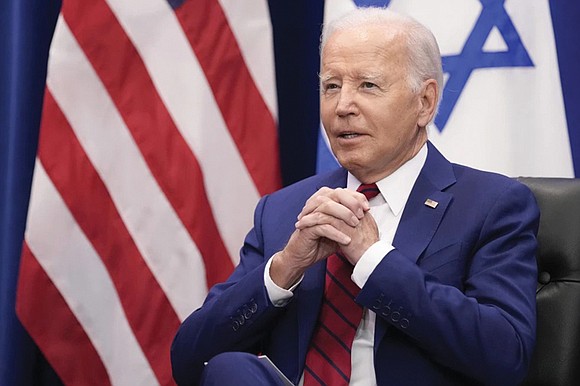Biden didn’t make Israeli-Palestinian talks a priority; Arab leaders say region now paying the price
Ellen Knickmeyer/The Associated Press | 10/19/2023, 6 p.m.

WASHINGTON - From its first months in office, the Biden administration made a distinctive decision on its Middle East policy: It would de-prioritize a half-century of high-profile efforts by past U.S. presidents, particularly Democratic ones, to broker a broad and lasting peace deal between Israel and the Palestinians.
Since Richard Nixon, successive U.S. administrations have tried their hands at Camp David summits, shuttle diplomacy and other big-picture tries at coaxing Israeli and Palestinian leaders into talks to settle the disputes that underlies 75 years of Middle East tensions. More than other recent presidents, President Biden notably has not.
Instead, administration officials early on sketched out what they called President Biden’s policy of quiet diplomacy. They advocated for more modest improvements in Palestinian freedoms and living conditions under Israeli Prime Minister Benjamin Netanyahu’s hardline government, which has encouraged settlement in the Israeli-occupied West Bank and includes coalition partners that oppose the U.S.-backed two-state solution. The less-ambitious approach fit with President Biden’s determination to pivot his foreign policy focus from Middle East hotspots to China.
But the long-term risks of sidelining the Israeli-Palestinian conflict exploded back into view with the Hamas attack on Israel on Oct. 7 and Israel’s heavy bombardment of Gaza in response. The United States’ angry Arab partners are pointing to America’s failure to actively engage as Israeli-Palestinian violence roars back to center stage.
President Biden’s travel to Israel and Jordan comes as concerns mount that Israel-Hamas conflict will spread. Hamas militants’ bloody breakout from Gaza and Israel’s military escalating response have killed thousands of civilians in Israel and Gaza, prompted President Biden to deploy carrier strike groups to the region, and threatens to spill conflict and flows of Palestinian refugees across borders.
In Cairo last weekend, Egyptian President Abdel Fattah el-Sissi was one of a succession of Arab leaders to warn Secretary of State Antony Blinken, who is scrambling through Middle East capitals to try to contain the conflict, that the Israel-Gaza war threatens the stability of the entire Middle East.
President Biden was likely to hear the same as he met with leaders of Jordan, Egypt and the Palestinian Authority in Jordan on Wednesday, after he traveled to Israel.
President Sissi who fears the Israeli military offensive will push Gaza’s 2.3 million people across the border into Egypt, cast blame on the near-disappearance of any international pressure on Netanyahu’s government and Palestinians to return to negotiations.
President Sissi cited “a buildup of outrage and hatred for more than 40 years” and the lack of any “horizon to solve the Palestinian cause; one that gives hope to the Palestinians” for a state with a capital in East Jerusalem.
Saudi Arabia, meanwhile, pointed to Saudis’ “repeated warnings of the danger of the explosion.”
Arab leaders “are very aware this is going to keep blowing up. And they might ride it out this time, they might ride it out next time, as they have in the past,” said Yezid Sayigh, a senior fellow at the Malcolm H. Kerr Carnegie Middle East Center in Beirut, Lebanon.
“But it’s not actually a comfortable position for them to be endlessly living in,” with endless cycles of Israeli and Palestinian wars that threaten the region’s peace and economies, said Mr. Sayigh, who accused the U.S. of encouraging Prime Minister Netanyahu to think there was no need to address Palestinian concerns. Underscoring his administration’s diminished emphasis on the Israeli-Palestinian conflict, President Biden’s call to Palestinian President Mahmoud Abbas this past weekend amid the building Gaza war was the American leader’s first since taking office.
In 1973, Arab nations’ surprise attack on Israel, and Arabs’ devastating oil embargo on the U.S. and other countries for their support of Israel in that fight, convinced U.S. leaders that a lasting resolution to Palestinian demands for statehood was in America’s strategic interest.
But after some early successes, recurring violence, the disappointments of past failed mediation efforts, and the scale of the disputes helped derail the U.S. push. By the time President Biden, a strong supporter of the state of Israel, took office, any support for major negotiations among Israelis was faint.
To be sure, there’s little to suggest ambitious engagement by President Biden on Israeli-Palestinian issues would have made immediate progress, or done anything to discourage the attack by Hamas, whose charter calls for the destruction of Israel.
Even after a 2021 burst of fighting between Hamas and Israel, administration figures argued that a big push on peace efforts would undermine more easily won goals, like cease-fires with Hamas.
Instead, President Biden has enthusiastically followed the new path that predecessor Donald Trump laid out on Middle East peacemaking: lobbying for so-called normalization deals with Arab countries, absent any Israeli-Palestinian accord.






